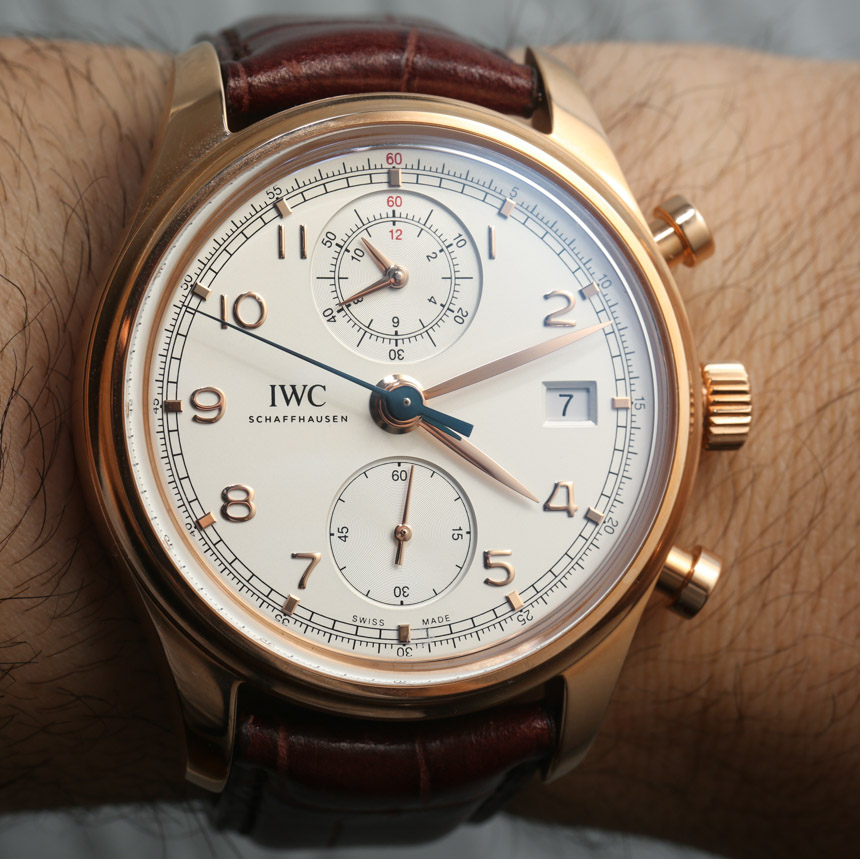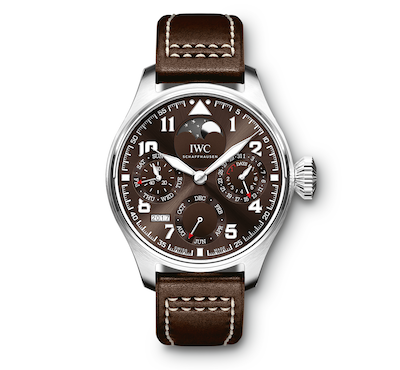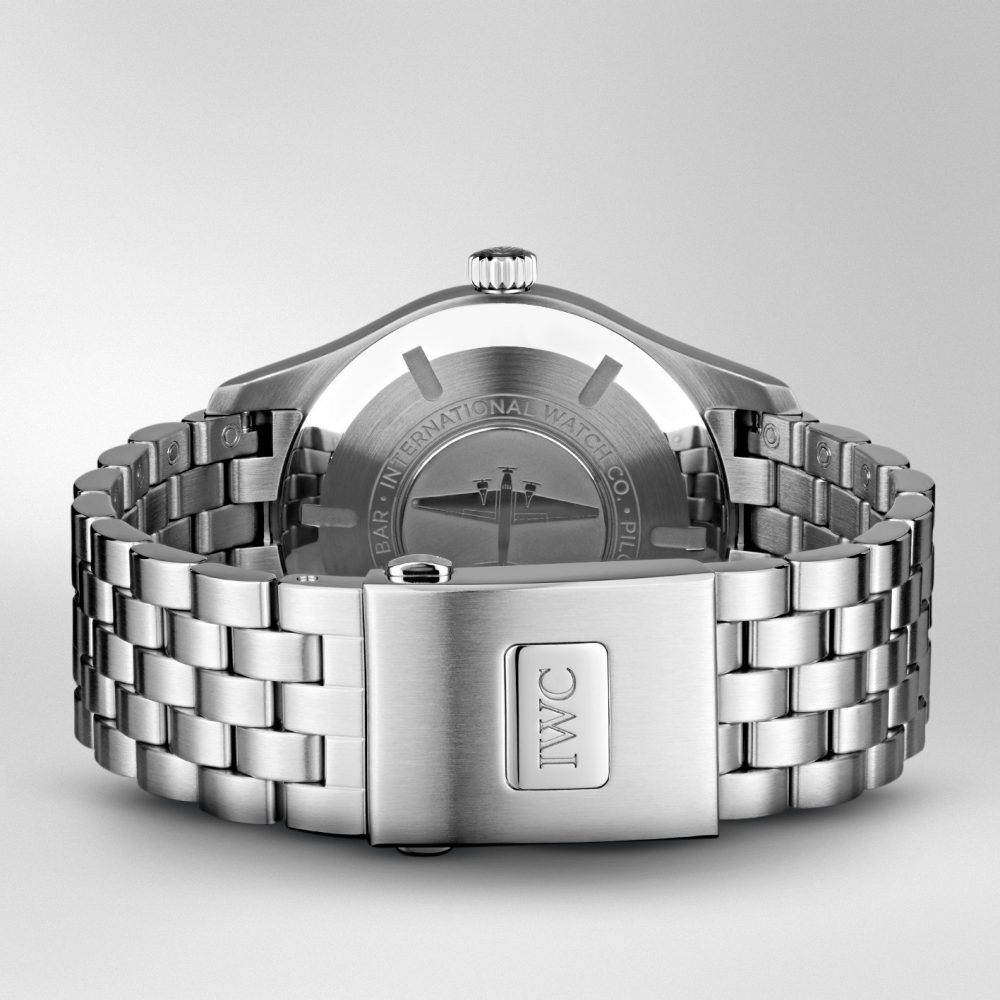How to Spot a Fake IWC Watch
IWC, or the International Watch Company, is renowned for the remarkable craftsmanship behind their timepieces. The brand is famous for its exceptional chronographs and tourbillons, especially in the pilot’s watches that made the brand famous in the 1930s and were built to survive the rigorous lifestyle led by an adventurer. IWC pieces connote luxury, but they also represent the needs of a wearer who prizes precision and demands the latest in watchmaking technology.
It is this unique combination of luxury and practicality that endears IWC to watch enthusiasts, but that is also what makes these pieces particularly susceptible to counterfeiting. We’ve pulled together some tips from our experts about spotting fake IWC watches to help you protect yourself from getting scammed with a counterfeit.
The Dial

A genuine IWC Portuguese Chronograph Classic
The IWC brand takes immense pride over the level of meticulous craftsmanship that it envelopes into the production of each timepiece. It is this craftsmanship that makes every precisely-engineered element of IWC timepieces fit together seamlessly. Counterfeiters are often less concerned about that exact fit, so forged IWCs are often off in terms of layout and material quality. Here are a few specifics to look for when examining the dial of an IWC watch that may be fake.
The Crystal
Like all luxury watches, genuine IWC watches have sapphire crystal guarding the face of the watch. This material is scratch-resistant and incredibly refined. To test whether the material on the face of your watch is sapphire crystal or just plain old glass, smear a drop of water or two on the surface. Sapphire crystal should not disturb the water’s surface tension, so it should pool together on the crystal. On glass, however, the water would disperse unevenly.
The Dial
Beneath the crystal, the dial of a genuine IWC watch is made with the highest quality metals with rich, uniform colors and ultra-sharp laser etchings and steel trimmings. Forged IWC watches, however, will not be made with such close attention to detail. For example, you will often find numbers, hour markers, and hands that are mismatched in color. Fake IWC watches also tend to have the wrong fonts for numbers and letters, and often in the wrong sizes. The hands will also be too short.
The Date Complication
IWC pays such close attention to detail that even the date disks can be indicative of whether a watch is a genuine IWC timepiece or not. On genuine watches, the date disk is flush against the frame opening and has a different design for each of the different IWC collections. In fact, different iterations between collections might even have different date disks. For example, the IWC Mark XVI Automatic has a different date window style than the IWC MARK XVII Automatic. Get to know the design of the genuine watch that you’re interested in well first so that you can immediately tell if another watch is fake or not. Counterfeiters will often use the wrong font, make the numbers too big, use the wrong date disk color, or have the date disk sunken in too far.
The Subdials
IWC watches often come with complications like a chronograph function, meaning the movement has additional elements. In genuine watches, the layout of the face of the watch, including (and especially) the placement of the subdials, has to perfectly correspond to these additional elements. Counterfeit IWC watches will often not follow the same layout since forgers will choose to move subdials closer to the center of the watch or make them smaller so that the face appears more symmetrical or appealing to the eye. These design changes seem small, but they are what can really help you discern a fake IWC watch from a real one.
In addition to that, the numbers on the subdials tend to be different on fake IWC watches, since counterfeiters pay much less attention to these sorts of details. In fact, make sure the subdials on your watch actually function! To make production cheaper, counterfeiters sometimes manufacture chronograph watches without a working chronograph function. To be sure, test out the pushers on the right side of your watch. There should only be two pushers on a chronograph, corresponding to the start/stop button and the flyback/reset button. They should be totally functional and incredibly precise at measuring time.
The Case

A genuine IWC Big Pilot’s Perpetual Calendar with a sleek case and protruding crown
IWC’s amazing timekeeping technology is precious, which is why they have developed very strong cases that are still sleek and appealing to the eye.
The Bezel
If you find another pusher at 10 o’clock, you can automatically dismiss the watch as a counterfeit. On a genuine luxury watch, this element is not actually a pusher, but a helium release valve. Brands like Rolex and Omega outfit their deep sea diving watches with helium release valves because its purpose is to maintain the watches’ water resistance under extreme pressure. IWC does make diving watches, but these are not outfitted with helium release valves.
The beauty of IWC watches is that the cases are sleek and unobtrusive. Barring the diving watches in the Aquatimer collection, which have thick cases to make the watches more water resistant, most IWC watches have thinner bezels to really make the dial designs stand out. Even the IWC Pilot’s Chronograph watches have cases that are quite slim. Because they’re made of strong, high-quality metals, these cases still protect the inner workings of the watch despite their leanness. As counterfeit watches are made of cheap metals, forgers will choose to thicken up the case design to add heft to the watch and make it seem heavier and more luxurious in feeling, as well as to protect the watch’s movement.
The Crown
Similar to the cases, the crowns of IWC watches are quite slim so that the focus is truly on the watches’ dial designs and so that the overall shape of the watches are unobstructed by more prominent crowns. Counterfeiters will use thicker crowns for their fake IWC watches simply because it’s cheaper and easier to manufacture one crown shape and size for all models than it is to specially engineer the crown design to suit each watch.
The only exception to this rule is the crown for IWC Big Pilot’s Perpetual Calendar, which has a significant size and remarkable design. Because the crown uses a triple position system to set the various subdials, IWC designed it to be a prominent part of the watch’s overall design. Make sure that your Big Pilot’s Perpetual Calendar’s crown also has a triple position system to set the complications of the watch—if not, it’s a fake.
The Bracelet

A genuine IWC stainless steel bracelet.
Even down to the lug width, IWC pays close attention to the details of their timepieces. For example, IWC watches tend to have an uneven-numbered lug width (e.g. 21 mm), which fits their specialized straps. Knock-off watches might go down a millimeter or two to save on production and material costs, so keep an eye out for tiny discrepancies like that.
Obviously, the strap or bracelet is an incredibly important aspect of a watch’s design, and IWC spares no labor in designing premium bracelets for their watches. IWC has two metal bracelet designs, two leather or textile strap designs, and one rubber strap design. Some of these strap or bracelet designs have very specific features and are worth examining when it comes to authenticating an IWC watch. IWC’s stainless steel link bracelet allows the wearer to slightly alter the size of the bracelet at any time with a push on the button with the IWC logo at the center of the cover on the clasp and a slight tug or push on the bracelet. Naturally, the addition of this specific feature will be out of the scope of counterfeiters’ abilities.
The Santoni leather straps are made of alligator leather and calfskin and have a very specific sheen. IWC describes it as a “patina-like shimmer” that’s halfway between the matte texture of untreated leather and the plastic-y shine of patent leather. Santoni straps look polished and protected, so if your watch comes with a fake-looking patent leather strap or a dull, matte leather strap, it’s probably inauthentic.
The rubber strap only comes with the IWC Aquatimer collection and has a patented quick-change feature that makes it easy for wearers to switch between a metal bracelet and the rubber strap. The bracelet is pushed into the locking bar from the top and engages audibly. To release, press the lever on the underside of the bracelet outwards with your thumb and push the bracelet upwards. If your watch is not an Aquatimer watch but it has a rubber strap, or if it is but the rubber strap does not have the quick-change function, then your watch is probably fake.
If you have further questions regarding TrueFacet’s authentication process, contact our concierge representative here.







